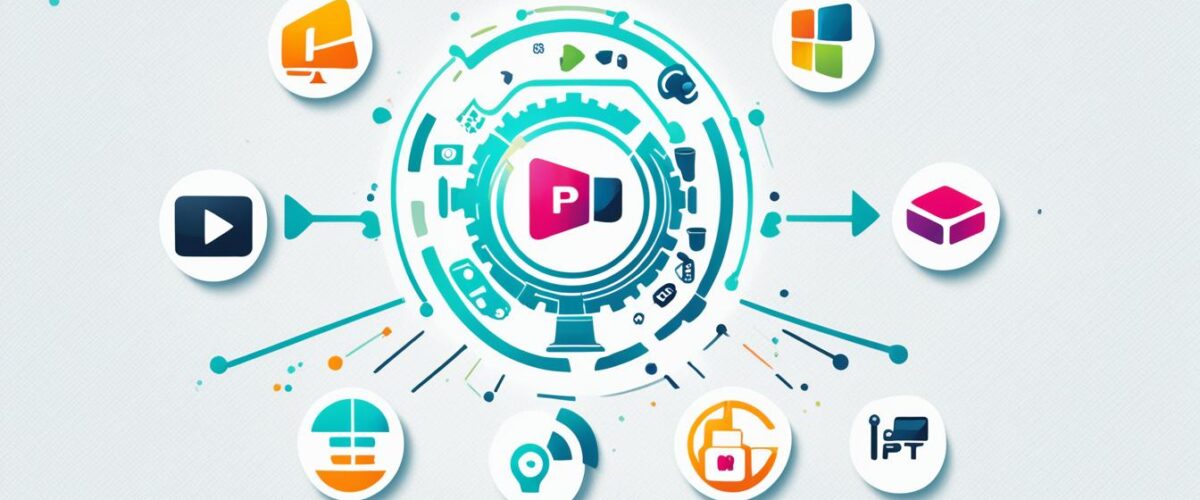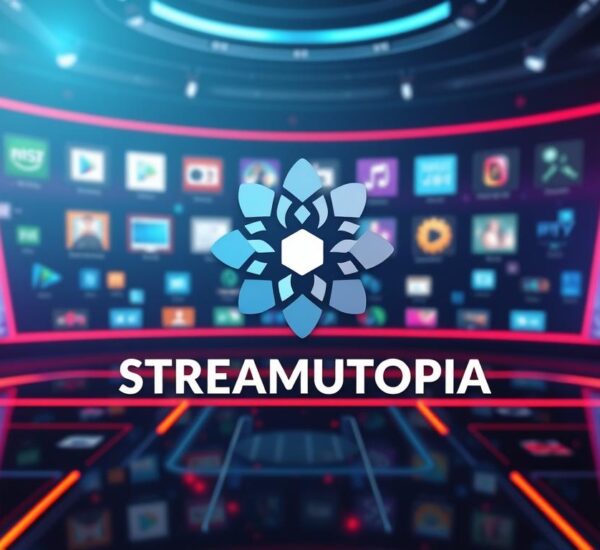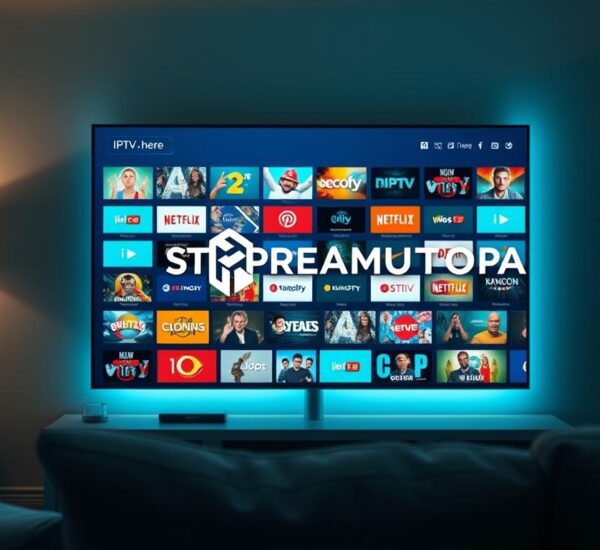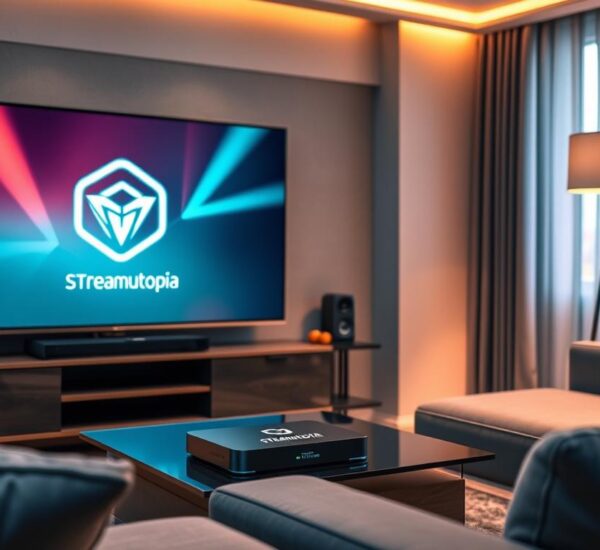Ever wondered what makes Internet Protocol Television (IPTV) different from old-school TV? IPTV is changing the game with its flexibility and choice. It’s becoming a top pick for viewers looking for something new. IPTV brings live TV and video on demand over the internet, offering it all for a subscription1. Let’s explore IPTV’s core, its services, and the benefits it brings to viewers today.
The IPTV market is expected to grow by 15.1% from 2023 to 20322. With devices like IPTV-compatible TVs and set-top boxes, watching TV has never been easier or more flexible1. This guide will clear up how IPTV works and why it’s changing the way we watch TV.
Key Takeaways
- IPTV uses the internet to deliver TV content, unlike traditional broadcasting.
- This tech supports live streaming, interactive features, and VOD options.
- More people are choosing IPTV for its on-demand TV services.
- IPTV appeals to many, from families to sports fans and international viewers.
- Stable networks and legal compliance are key for IPTV users and providers.
What is IPTV?
IPTV stands for Internet Protocol Television. It’s a new way to watch TV that uses the internet instead of old TV systems. This means you can watch shows and movies over the internet, not just through antennas or satellites.
Definition of Internet Protocol Television
IPTV lets you watch TV shows and movies over the internet. You can watch live shows or movies whenever you want, not just at certain times. Many places use IPTV to make waiting areas more fun, offering TV and digital signs together3.
Contrast with Traditional TV Systems
Old TV systems send the same shows to everyone at the same time. This limits what you can watch and when you can watch it. IPTV is different, letting you choose from a huge library of shows anytime you want. It’s becoming very popular, expected to grow a lot by 20294
In countries like the United States, India, and the United Kingdom, many people love IPTV. It offers live TV, movies on demand, and more, giving viewers more control over what they watch. IPTV is changing how we watch TV, making it more flexible and fun.
How IPTV Technology Transforms TV Viewing
IPTV technology has changed how we watch TV. It moved from old-school analog to digital broadcasting. Now, viewers can watch shows and movies online, breaking free from old limits. This change means people can watch a lot of channels and shows whenever they want.
This shift is big news for the entertainment industry. Experts think it will grow to about $116 million in the next five years5.
Shift from Analog to Digital Broadcasting
The idea of IPTV started in the early 1990s and has grown a lot since then6. When high-speed internet became common in the early 2000s, IPTV became more popular worldwide6. Unlike old TV systems that need cables or satellites, IPTV uses digital signals. This is a big step forward.
IPTV offers live TV, shows you can watch later, and on-demand videos. This gives viewers lots of choices6.
Convenience and Accessibility of IPTV
IPTV lets viewers pick what they want to watch. Services like IPTV Smarters and GSE Smart IPTV have different subscription plans6. Devices like Amazon Fire Stick, Roku, and Apple TV make IPTV easy to use for those who like technology6.
IPTV is changing fast, with cloud-based systems offering more features and better experiences. This makes it more efficient and allows for better ads and streaming quality5.
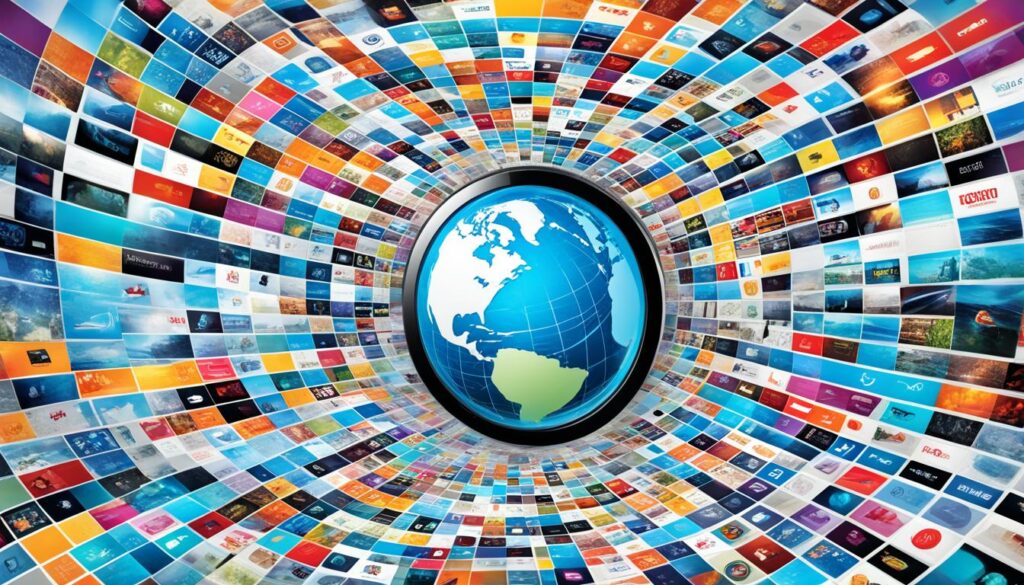
The Importance of IPTV Protocols
IPTV technology has changed how we watch media. Protocols like the Transmission Control Protocol and Internet Protocol (TCP/IP) are key for quality and reliability. They help manage video traffic over the internet. With IPTV protocols, providers can offer high-definition streaming and reduce buffering. This makes watching shows online smooth and enjoyable.
Overview of Transmission Control Protocol/Internet Protocol
The Transmission Control Protocol is vital for setting up connections and sending data reliably. It helps manage data, so many IPTV streams can run at once without losing quality. TCP/IP makes IPTV services better, offering a good alternative to old TV broadcasting. As IPTV grows, so does the importance of these protocols, thanks to faster internet at home.
Unicast vs. Multicast Streaming
Knowing the difference between unicast and multicast streaming is crucial for providers and users. Unicast sends content to one user at a time, while multicast lets many users watch the same show together. This can make streaming more efficient and save bandwidth for live events. Each method has its perks; unicast offers a personalized experience, while multicast makes it easier to access live shows.
As streaming grows in popularity, understanding unicast and multicast is key. Using strong IPTV protocols lets users enjoy a wide variety of shows. This keeps them connected to their favorite channels and shows.
Explore the futureof TV streaming with IPTV. It’s changing how we watch TV, letting us pick how and when we watch our favorite shows78.
IPTV Services Explained
IPTV services have become very popular today, offering many options for viewers. The types of IPTV services can really change how you watch TV. It’s important to know about these options and how they work to pick the best one.
Types of IPTV Services Available
There are many types of IPTV services for different needs, including:
- Live IPTV: Shows TV channels as they happen.
- Video on Demand (VOD): You can watch shows when you want.
- Time-Shifted TV: Record and watch shows whenever you like.
Reports say over a billion people now use IPTV, showing how popular it has become9. This growth matches the increasing demand for IPTV, which is growing by 30% to 35% each year9. IPTV supports many features like video-on-demand, interactive TV, and live streaming10.
The Subscription Model in IPTV
The subscription model for IPTV lets users pick plans that suit their viewing habits. You can choose from monthly or yearly plans. Services like StreamUtopia offer flexible packages for different customers. This flexibility makes IPTV appealing to many viewers.
Advertisers also see IPTV as a great way to reach viewers, making it a good way to make money9.
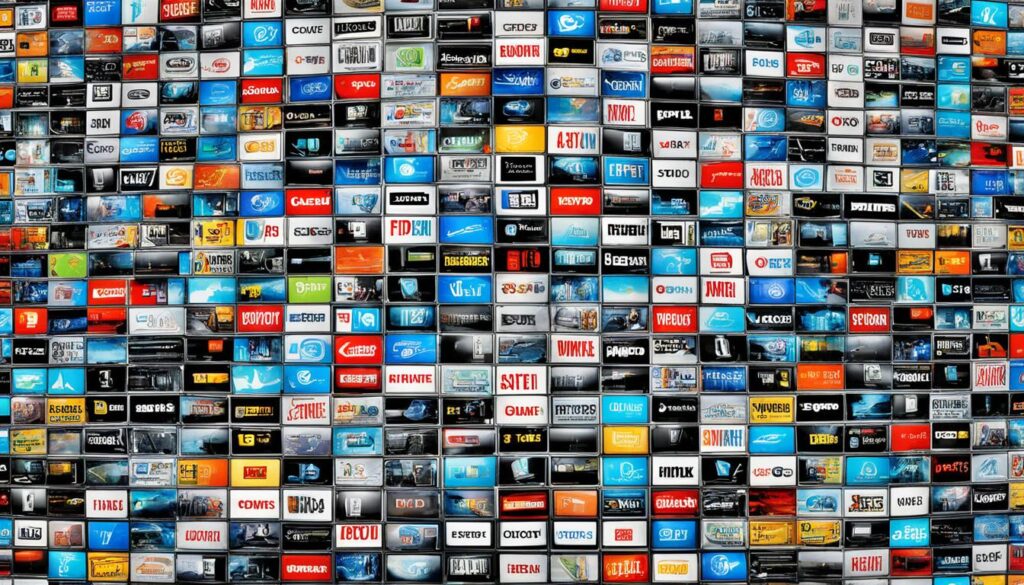
Countries like France, Germany, and the UK are leading in IPTV use in Europe9. India is also growing fast, expected to soon beat many European countries9. Knowing about the subscription options and types will help users find the best IPTV for their needs. It also helps with understanding any content restrictions or legal issues11.
How IPTV Streaming Works
IPTV streaming brings TV content to your devices through the Internet Protocol (IP). It lets users watch live TV on their devices. The Real-Time Streaming Protocol (RTSP) is key to this smooth process. It handles the sending and playing of video content.
Real-Time Streaming Protocol (RTSP) Details
RTSP is vital for IPTV streaming. It makes sure media is delivered in real-time. When you pick a show, RTSP starts the stream quickly. This means you can watch live events smoothly.
Compression Techniques for Optimized Playback
For better IPTV streaming, we use advanced video compression. This makes files smaller but keeps the quality high. It helps with faster loading times, even on slower internet.
These methods are key for smooth streaming. For more info on IPTV solutions, check out this resource11.
IPTV Channels and Content Offerings
IPTV channels are changing how we watch TV, offering many programming choices. They let viewers pick what they want to watch, unlike traditional TV. This makes watching TV more fun and personal.
Live IPTV Channels vs. On-Demand Content
Live IPTV channels show shows as they happen, just like regular TV. This brings people together for big events. On the other hand, on-demand lets you watch shows and movies when you want. IPTV uses different methods for live and on-demand content, meeting everyone’s needs128.
Time-Shifted TV Services
Time-shifted TV lets you pause, rewind, or replay shows after they air. This makes watching TV more flexible. You can enjoy shows in high-definition or UHD on devices like set-top boxes or smart TVs128. More people are cutting the cord and choosing on-demand TV for a better viewing experience8.
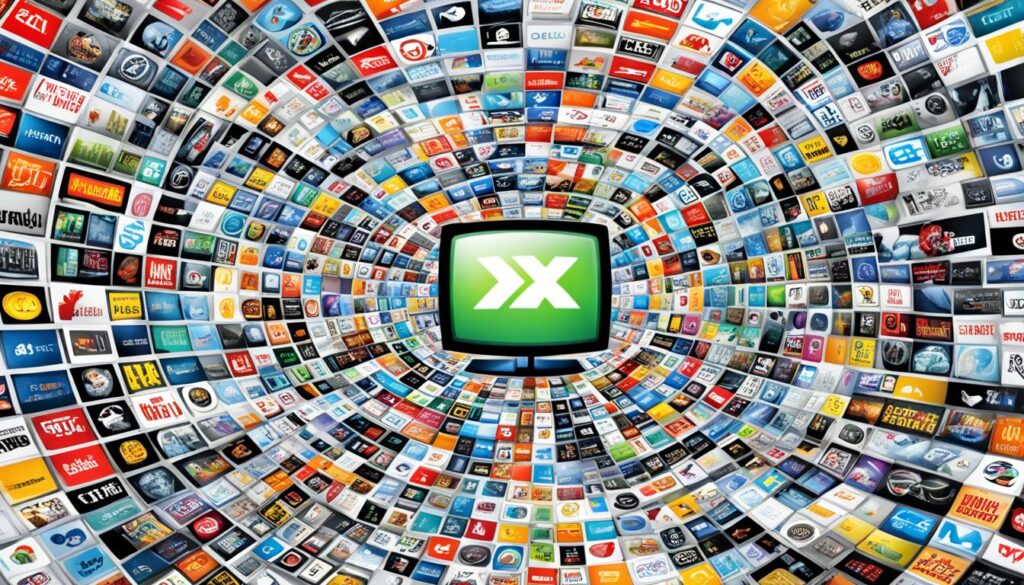
IPTV Setup Requirements
Setting up IPTV is easy and needs certain hardware and a good internet connection. Make sure you have the right parts for a great IPTV setup. This makes watching channels and content smooth and enjoyable.
Hardware Needed for IPTV Access
To use IPTV well, you only need a few pieces of hardware. A device with set-top boxes is key. These devices turn internet data into something you can watch on your TV. If you stream on a computer, you might not need extra hardware.
Wi-Fi Connectivity and Set-Top Boxes
Having strong Wi-Fi is key for a good IPTV experience. IPTV needs a strong internet connection for smooth streaming in HD or 4K. Factors like buffering can affect IPTV performance. Using reliable internet tips can make your IPTV setup better.
For help on setting up IPTV on an Amazon Fire TV Stick, including using the IPTV Smarters Pro player, check out detailed instructions1314.
Choosing an IPTV Subscription
Finding the right IPTV subscription is key for a great viewing experience. It’s important to look at several factors that affect your happiness with a service. These include the variety of content, streaming quality, customer support, and price. Each one is important in finding the best service for you.
Factors to Consider When Selecting a Provider
- Content Variety: Check how many channels and on-demand shows the IPTV service has. For example, Xtreme HD IPTV has over 20,000 live channels and 40,000 VOD options, offering a lot to choose from15.
- Streaming Quality: A good stream quality is key for a great watch. Services like RocketStreams focus on delivering high-resolution sports broadcasts, perfect for sports fans15.
- Customer Support: Good customer support makes a big difference. IPTV Trends is known for its great support and affordable prices, along with a wide channel selection15.
- Pricing: Prices for subscriptions can really vary. It’s smart to compare different plans to find one that fits your budget and meets your needs.
Popular IPTV Providers and Services
Some IPTV services are really popular for their special features. For instance, IPTV Smarters is easy to use and works on many devices. It lets users enjoy a wide range of content from their favorite devices, showing how people want more flexibility in watching media16.
Other top providers include:
- Beast IPTV: It’s known for being reliable, offering about 12,000 live channels and a big VOD library, meeting different viewing needs15.
- IPTV Trends: This service has a lot of live channels and a huge VOD library. It’s popular because it’s affordable and streams well15.
- RocketStreams: Great for sports fans, it has over 3,000 live channels and makes watching events easy and fun, improving viewer engagement15.
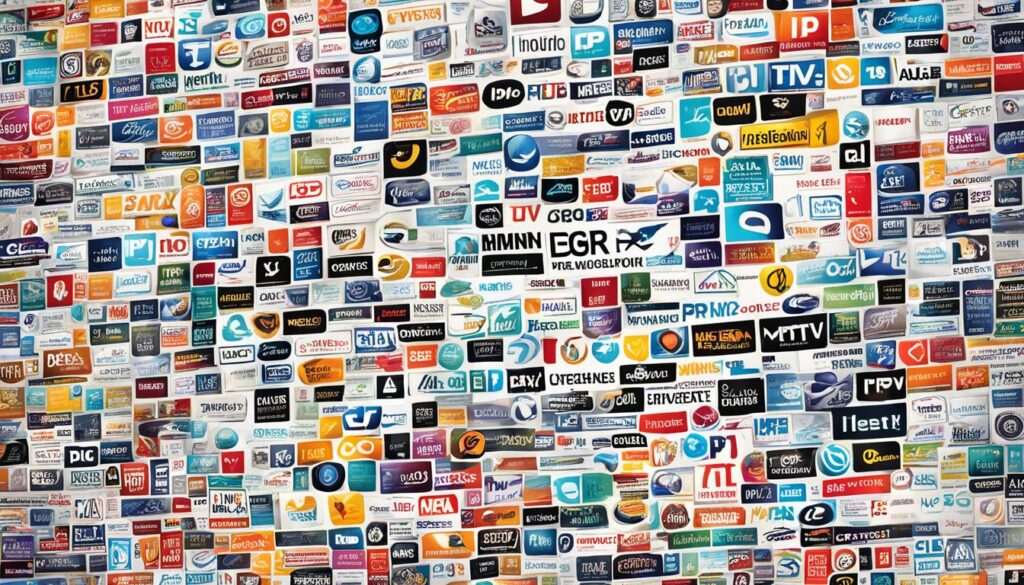
Comparing IPTV with Traditional Cable and Satellite TV
Comparing IPTV with traditional cable and satellite TV shows their ups and downs. IPTV streams TV channels and on-demand content over the internet. This means viewers can watch on devices like smartphones, tablets, smart TVs, and computers17. Traditional cable TV, on the other hand, reaches many areas with reliable connections. It offers consistent picture and audio quality through cables17.
Advantages of IPTV Over Traditional Methods
- Flexibility: IPTV lets viewers watch on various devices18.
- Cost-Effectiveness: IPTV plans are often cheaper than cable TV, with fewer hidden costs18.
- On-Demand Content: IPTV has high-quality video with fewer interruptions, making it great for on-demand shows19.
Disadvantages and Limitations of IPTV
- Internet Dependence: IPTV’s quality depends on internet speed, which can cause buffering and lag18.
- Limited Availability: Some areas lack stable high-speed internet, limiting IPTV use18.
- Signal Interruptions: Unlike cable, IPTV’s quality can be affected by internet stability18.
The Future of IPTV Technology
IPTV is set to grow as it takes on new trends and innovations. It’s getting more interactive, making watching TV more fun. Most people now prefer watching shows on demand over live TV, showing how flexible viewing habits are becoming20. By 2024, 72% of all internet traffic will be from IPTV and online videos, proving its growing popularity21.
Trends in Internet Protocol Television
As IPTV evolves, it meets viewer demands for better experiences. Hotels and offices are turning to IPTV for its ability to deliver content across many devices and places. This lets them easily change their offerings as needs shift21. Many viewers enjoy interactive TV features, showing a move towards more engaging watching20. Advanced analytics help make content more personal, thanks to AI-driven personalization21.
Innovations Shaping the IPTV Landscape
New IPTV innovations aim to boost user experience with better compression and virtual reality. These tech advancements help deliver high-quality video and audio without using too much bandwidth. IPTV uses the internet we already have, avoiding the need for expensive new equipment21. It’s cheaper than traditional TV options, making it more appealing to viewers20. So, IPTV’s new features not only meet today’s needs but also set the stage for tomorrow’s advancements.
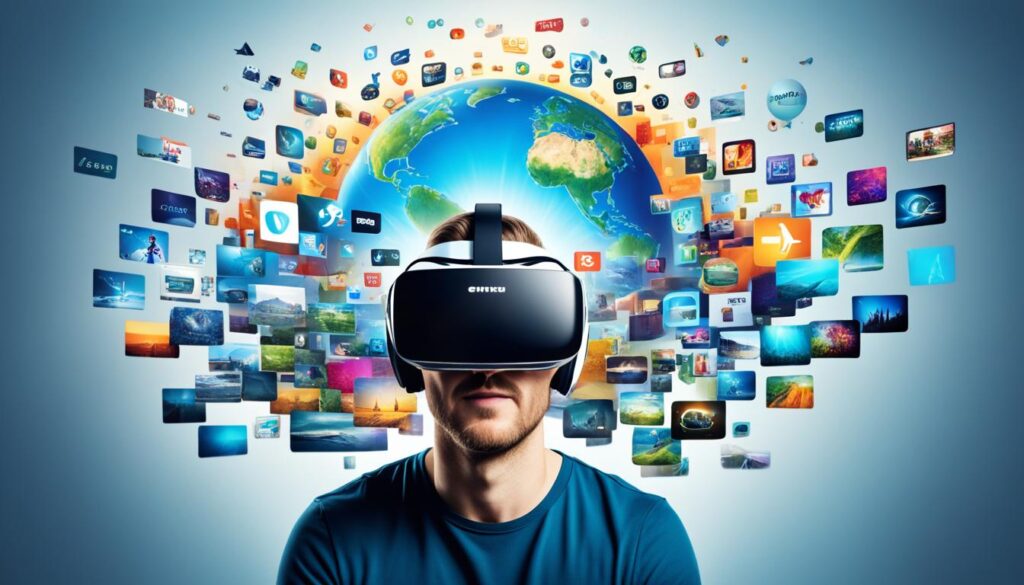
Understanding How IPTV Works: A Simple Guide
IPTV works by following a series of steps for delivering content efficiently. It starts with a user asking for something, which goes to the IPTV service provider. There, the server finds the content and sends it over the internet to the user’s device. Finally, the device decodes the content for the user to watch.
The Steps of IPTV Content Delivery
The steps to deliver IPTV content are:
- User requests the desired content.
- Server processes the request and retrieves the content from a database.
- Data packets are transmitted through the network to user’s device.
- The device decodes the streaming data, allowing for playback.
IPTV offers a wide range of TV channels and interactive features over the internet on different devices. This makes it more engaging and accessible for users22.
The Role of ISPs in IPTV Services
ISPs are key to a smooth IPTV experience. They ensure the internet speed needed for streaming without interruptions. A good network manages video traffic well, making the service reliable and high-quality10. As more people switch to digital, IPTV is getting more popular1.
ISPs support different IPTV services like VOD and live broadcasts. They help users get to a flexible and interactive TV experience.
| IPTV Service Types | Description |
|---|---|
| Video on Demand (VOD) | Allows users to select and watch content whenever they choose. |
| Live IPTV | Streams content in real-time, mimicking traditional television. |
| Time-Shifted TV | Lets users watch previously aired programs within a limited time frame. |
Understanding IPTV and ISPs’ roles is key to how we watch videos today22110.
Challenges and Considerations for IPTV Users
IPTV offers many benefits, but users should know about the challenges it may bring. Network reliability is a big issue, affecting streaming quality. Users often face buffering, which can ruin their viewing and cause frustration. Studies show that buffering issues are common among IPTV users, highlighting the need for a stable internet connection23.
This problem makes users look for reliable internet service providers (ISPs) for a better experience.
Network Stability and Reliability Issues
Network issues come from internet speed, stability, and provider quality. Many users face interruptions, making it key to check service quality. IPTV’s performance can change with bandwidth, especially when many people are online. A lot of IPTV users prefer on-demand over live TV, showing they value convenience over streaming issues11.
Potential Legal and Regulatory Concerns
There are also legal worries with IPTV, like copyright issues. Many IPTV services are under scrutiny for these problems. It’s important for users to pick services with clear licensing to avoid legal trouble. With IPTV becoming more popular, knowing about both technical and legal aspects is crucial for a good viewing experience.
| Issue | Description | Percentage Affected |
|---|---|---|
| Buffering Problems | Users experiencing interruptions during streaming. | Occur frequently among IPTV users |
| On-Demand Preference | Users opting for flexibility in viewing content. | Growing percentage of IPTV users |
| Legal Concerns | Issues over content licensing affecting IPTV providers. | Significant factor impacting user choice |
Knowing these challenges helps users make better choices about IPTV services. They can balance the benefits of internet TV with the need for reliability and legal okay23.
Enhancing Your IPTV Experience
To make your IPTV better, focus on both technical setup and user engagement. A well-set environment and exploring features can change how you watch TV. Knowing how to set up IPTV leads to better video quality and more content access.
Tips for Maximizing Your Viewing Quality
One key tip for better viewing is a strong, stable internet connection. Your streaming quality depends on your bandwidth. IPTV gives you great image and sound quality without interruptions because it uses reserved bandwidth for videos24. Using devices like smartphones, tablets, and smart TVs makes it easier to access IPTV25. MAG devices and Android boxes also work well. Think about device compatibility and channel options when picking an IPTV provider25.
Exploring Interactive and Additional Features
Many IPTV providers have interactive features that make watching TV better. For example, the Electronic Program Guide (EPG) lets you see what’s on now and pick what you want to watch25. You can also watch shows you missed with playback IPTV, giving you more control over your viewing schedule25. Using these features can make your IPTV experience much better, making you happier with your service24. For extra security, think about using a VPN like NordVPN. It’s known for fast connections and strong encryption25.
StreamUtopia: Your IPTV Solution
StreamUtopia is a top choice for IPTV, offering a solution that suits many viewers. It focuses on quality content and making users happy. Customers can pick from different subscription packages that match their needs. They get access to a huge selection of channels, including sports, movies, and documentaries. There are options for monthly or yearly plans.
Flexible Subscription Packages Overview
StreamUtopia offers flexible subscription packages at great prices. Users can choose from basic or full channel lineups for live and on-demand content. Many users love the smooth viewing experience it provides.
What Sets StreamUtopia Apart from Others?
StreamUtopia is known for its advanced user interfaces and reliable streaming tech. It’s praised for its high-quality streaming and customer support. The IPTV market is expected to hit $104.25 billion by 2025, making StreamUtopia a key player26. For more info on IPTV tech, check this link.
Conclusion
IPTV has changed how we watch TV by giving us lots of choices and easy access. It lets us watch live TV, on-demand shows, and catch-up TV. This suits different ways people like to watch. Top services like Netflix, Disney+, and Hulu show the wide range of content available through IPTV channels27.
Looking ahead, IPTV is more than just a trend. It’s a big change in how we enjoy media, offering high-definition and 4K video quality. IPTV services are becoming more popular worldwide, with flexible subscription plans and the ability to watch anywhere with internet23.
Understanding IPTV shows its big impact on how we watch entertainment. It gives people the freedom to make their own viewing choices. This ensures that entertainment is not just personalized but also easy to get28.
FAQ
What is IPTV?
How does IPTV differ from traditional TV systems?
What are the main types of IPTV services available?
What equipment do I need for IPTV setup?
What protocols are used for IPTV streaming?
Why is internet speed important for IPTV?
What are some challenges when using IPTV?
How can I enhance my IPTV watching experience?
What are some popular IPTV subscription services?
What innovations are shaping the future of IPTV?
Source Links
- An A-to-Z Guide to IPTV: What It Is and How It Works – https://target-video.com/what-is-iptv/
- What Is IPTV: How It Works, Types, Pros, & More – https://www.redswitches.com/blog/what-is-iptv/
- What is IPTV ? Uniguest IPTV & Digital Signage – Internet Protocol Television – https://uniguest.com/what-is-iptv/
- What is IPTV? Understanding the Ongoing Revolution in Digital Media – https://www.uscreen.tv/blog/what-is-iptv/
- IPTV 2.0 – The Ultimate Guide to IPTV for Video Streaming – https://www.harmonicinc.com/insights/blog/iptv-video-streaming
- What is IPTV? Discover the Ultimate Guide to Modern TV Streaming – BlueAngelHost – Official Blog – https://www.blueangel.host/blog/what-is-iptv/
- Internet Protocol television – https://en.wikipedia.org/wiki/Internet_Protocol_television
- A Beginner’s Guide to IPTV: How it Works and Benefits – https://insidepulse.com/2024/06/06/a-beginners-guide-to-iptv-what-you-need-to-know/
- What is IPTV? The Best IPTV Guide and Benefits of IPTV – https://blog.webnexs.com/what-is-iptv-the-best-guide-and-benefits-of-iptv/
- What is IPTV (Internet Protocol television) and how does it work? – https://www.techtarget.com/searchnetworking/definition/IPTV-Internet-Protocol-television
- IPTV: A Comprehensive Guide to Understanding How it Works – https://medium.com/@bikergear.store/iptv-a-comprehensive-guide-to-understanding-how-it-works-c360052b03d
- IPTV Explained: What It Is and How It Works – https://ultahost.com/blog/what-is-iptv/
- Unlocking the Potential: A Comprehensive Guide to Getting Started with IPTV for Beginners – https://medium.com/@XtreamOnline/unlocking-the-potential-a-comprehensive-guide-to-getting-started-with-iptv-for-beginners-c6b5d102fca6
- How to Start your own IPTV Business? [Mar 2023 Update] – https://www.vplayed.com/blog/what-is-iptv-how-does-iptv-works/
- IPTV Subscription: The Ultimate Guide to Choosing the Best Service – https://www.linkedin.com/pulse/iptv-subscription-ultimate-guide-choosing-best-william-seo-master-uzojf
- Understanding IPTV: A Comprehensive Guide – https://medium.com/@abdowar2/understanding-iptv-a-comprehensive-guide-e559b07e31b5
- IPTV vs Cable TV vs Satellite: Pros & Cons Guide – https://iptvsnake.com/iptv-vs-cable-tv-vs-satellite-pros-cons-guide/
- IPTV vs. Cable TV: Which is better? – GeeksforGeeks – https://www.geeksforgeeks.org/iptv-vs-cable-tv/
- Cable, Satellite, IPTV & OTT Streaming: What’s the Difference? – BroadbandNow – https://broadbandnow.com/report/cable-vs-satellite-vs-iptv-vs-ott-streaming
- The Comprehensive Guide to IPTV: Features, Benefits, and Provider Selection – https://medium.com/@oryamine/the-comprehensive-guide-to-iptv-features-benefits-and-provider-selection-47a7fc6dfa57
- Internet Protocol Television (IPTV)—How It Works and Why It’s Critical for Business in 2024 – https://suncomm.tv/internet-protocol-television-iptv-how-it-works-and-why-its-critical-for-business-in-2024/
- How to Start Your Own IPTV Business: Guide for 2023 – https://www.muvi.com/blogs/how-to-start-iptv-business/
- How It Works and Why It’s Common – EPCB – https://epcblind.org/2024/07/15/understanding-iptv-how-it-works-and-why-its-common/
- IPTV vs. OTT – Internet TV Explained – https://corp.kaltura.com/blog/iptv-ott/
- The IPTV Guide – The Ultimate IPTV Guide (2024) – https://www.theiptvguide.com/iptv-guide/
- Guide to Understanding IPTV Technology Essentials – https://arkimedia.net/guide-to-understanding-iptv-technology-essentials/
- What is IPTV? How Does it Work – https://blog.webnexs.com/what-is-iptv-how-does-it-work/
- What is Internet Protocol Television (IPTV)? – Nevron – https://nevron.eu/blog/iptv/
